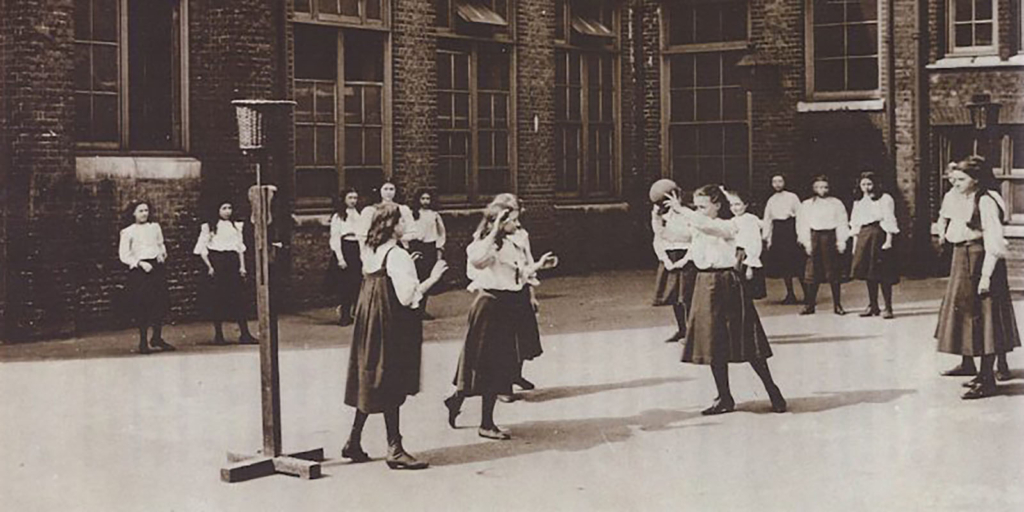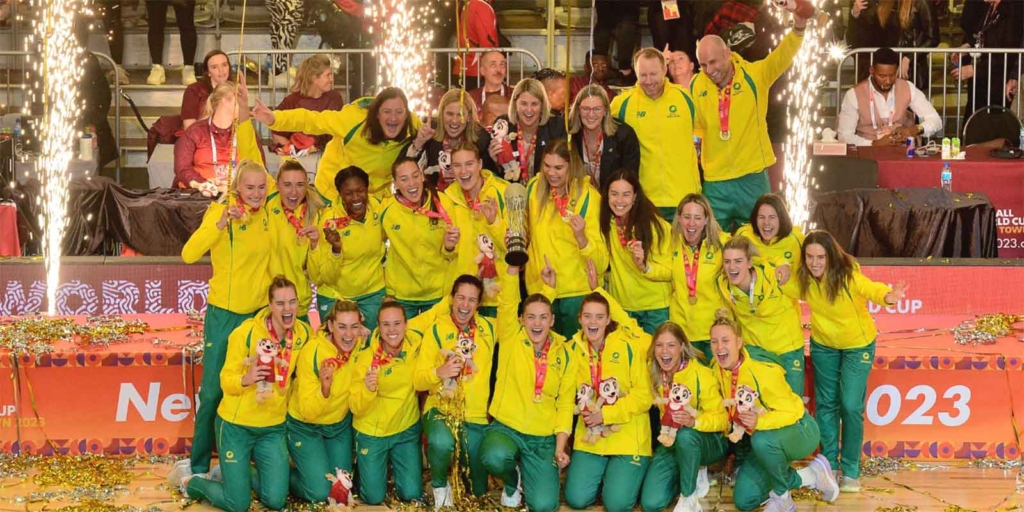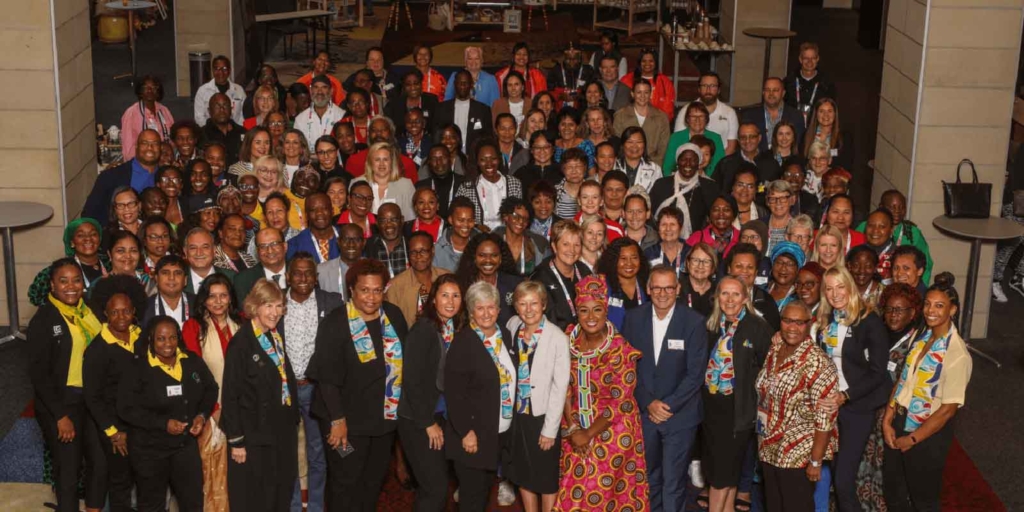History of Netball

In 1891 in Springfield, Massachusetts a 30-year-old Canadian immigrant to the USA, James Naismith, was ordered to invent an indoor game for high-spirited young men at the School for Christian Workers (later the YMCA).
Most games tried ended with injury rates of staggering proportions! So Naismith conjured up a game whereby a ball had to be lobbed into a high peach basket (his reasoning being that if a ball had to dropped into the “goal”, it couldn’t be thrown at breakneck speed).
Basketball was born, with the original game featuring nine players – three forwards, three centres and three guards – simply because Naismith had 18 youths to keep amused.
Women’s indoor basketball began exactly two days later when female teachers to the gym were captivated by the game but it wasn’t until 1895 that the current game of netball was well and truly shaped. When Clara Baer, a sports teacher in New Orleans, wrote to Naismith asking for a copy of the rules, the subsequent rules package contained a drawing of the court with lines penciled across it, simply to show the areas various players could best patrol. But Baer misinterpreted the lines and thought players couldn’t leave those areas! In 1899 her mistake was ratified into the rules of women’s basketball as zones.
Three-bounce dribbling had quickly been extended in the men’s game (which didn’t have no-go zones), but it was seldom used in the women’s version when it reached Britain and the Empire. In fact, there was no pressure to increase that form of ball movement and in the end dribbling simply ceased to exist.
Netball was first played in England in 1895 at Madame Ostenburg’s College. In the first half of the 20th century, Netball’s popularity continued to grow, with the game being played in many British Commonwealth countries. There were no standard rules at that time with both nine-a-side and five-a-side versions of the game.
During an Australian tour of England in 1957, discussions took place concerning standardising the rules of the sport and this led to representatives from England, Australia, New Zealand, South Africa and The West Indies meeting in Sri Lanka in 1960, to establish The International Federation of Women’s Basketball and Netball. Formal rules were established at this inaugural meeting and it was decided to hold World Championship tournaments every four years, beginning in Eastbourne, England, in 1963.

Netball World Cup
Since the first event in Eastbourne in 1963 the previously named World Championships have been held in Australia 1967, Jamaica 1971, New Zealand 1975, Trinidad & Tobago 1979, Singapore 1983, Scotland 1987, Australia 1991, England 1995 and New Zealand 1999. Throughout this period, Australia has dominated, winning the event in 1971, 1975, 1979, 1983, 1991, 1995 and 1999. The 2003 World Netball Championships in Kingston, Jamaica saw New Zealand finally breaking the Australian dominance taking Gold. The 2007 World Netball Championships was due to take place in Fiji but a political coup in the country led to the event being transferred to Auckland, New Zealand. Despite the home advantage, New Zealand were unable to defend their crown and Australia were once more World Champions. Australia retained their title in 2011 in Singapore and in 2015 in Sydney.
In 2019 Liverpool welcomed the world for the 15th edition of the Netball World Cup which saw New Zealand win their fifth world title to end Australia’s dominance. In 2023, Cape Town hosted the first ever Netball World Cup on the African content as the Netball World Cup marked its 60th anniversary. It was Australia that claimed Gold as they secured their 12th World Title.
Netball World Youth Cup
As part of the Australian Bicentenary Celebrations in 1988, a Youth Tournament took place in Canberra, for players aged under 21. Its success led to this event being held once every four years. Fiji hosted the 2nd World Youth Netball Championship, Canada the 3rd and Wales the 4th.. Australia were winners in 1988, New Zealand in 1992 and Australia again in 1996 and 2000. At the 2005 World Youth Netball Championship, held in the USA, New Zealand won Gold, England Silver and Australia took the Bronze. In 2009 the Cook Islands hosted which saw Australia regain the trophy, however they were unable to defend their title in 2013 with New Zealand winning the event in Scotland.
The Netball World Youth Cup planned for Fiji in 2021 had to be cancelled due to the pandemic, meaning that the last NWYC took place from the 8th-16th July 2017 in Gaborone, Botswana. This marked the 8th staging of the event with New Zealand creating history by beating Australia to win back-to-back titles for the first time.
Olympic Games
In 1995 Netball became a “recognized” sport of the International Olympic Committee (IOC) and in August 2021, World Netball declared its intention to work with Netball Australia to make a compelling case for Netball’s inclusion in the Brisbane 2032 Olympic Games.
Commonwealth Games
Netball was included in the Commonwealth Games programme, for the first time, in 1998 in Kuala Lumpur, where Australia took the Gold medal, New Zealand Silver and England the Bronze. It was also a programmed sport in 2002 Commonwealth Games in Manchester (England), where Australia again took the Gold medal, New Zealand Silver and Jamaica edging out England for the Bronze. In 2006 (Melbourne, Australia) and 2010 (Delhi, India) New Zealand beat Australia and England won the bronze medal.
The 2018 event took place on the Gold Coast in Australia and for the first time ever these Games had an equal number of medal events for both men and women. This event saw England make history as they stunned Australia in the Final with a one goal victory securing them the Gold Medal. Jamaica claimed Bronze Medal as New Zealand missed out on a medal.
The event went to Birmingham, England in 2022 with Jamaica making history as they progressed to their first Commonwealth Games Final, however Australia clinched the Gold Medal, Jamaica Silver and New Zealand Bronze.
FAST5 Netball World Series
In 2008 World Netball developed a new format of the sport which was named Fast Net. This was a 6-a-side game launched in 2009 at the World Netball Series in Manchester, England.
Following a review of Fast Net this was further developed into a 5-a-side game called FAST5 – which is the format used at the FAST5 Netball World Series.
History was made at the 2022 event, as for the first time there was also a men’s FAST5 NWS. This was the first time men competed in a World Netball event, and the teams involved were New Zealand, Australia and England.

World Netball History
As the sport has evolved so has the international governing body as the International Federation of Netball Associations (IFNA), now named World Netball, has also moved with the times in what is an ever changing and challenging global environment
At Congress 2011 Australian netball stalwarts Deidre Hyland AM and Dorothy (Dot) McHugh OAM launched their book, ‘Netball – State of Play’, a history of the first 50 years of the International Federation of Netball Associations to coincide with IFNA’s Golden Jubilee.
Based primarily on documentary evidence, the book traces the early development of the Federation, the evolution of the international game, and the development of the sport of netball beyond the Commonwealth.
One of the most interesting sections of the book contains the reflections of a number of significant people, including Marva Bernard OD from Jamaica, Anne Taylor OBE (New Zealand), and Baroness Sue Campbell CBE (England), on where they see the Federation heading in the next 50 years.
At Congress 2019, Liz Nicholl CBE, former CEO of UK Sport, was elected as INF President and took over from Hon Molly Rhone OJ, CD on the 21st July 2019. At Congress 2023, Dame Liz Nicholl DBE was re-elected as World Netball President and World Netball appointed their first Athlete Director, Stacey Francis-Bayman, to sit on the World Netball Board.
World Netball now has eighty-four (84) Members, sixty-four (64) Full Members and twenty (20) Associate Members.